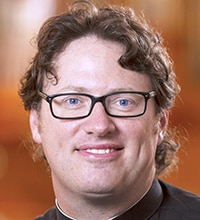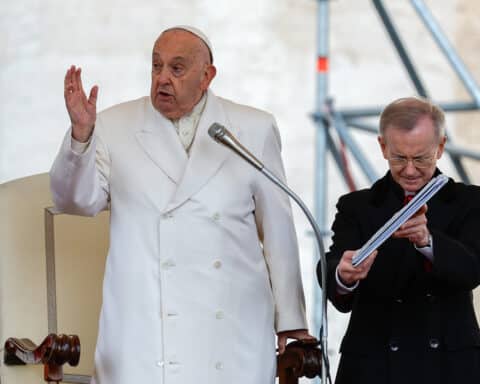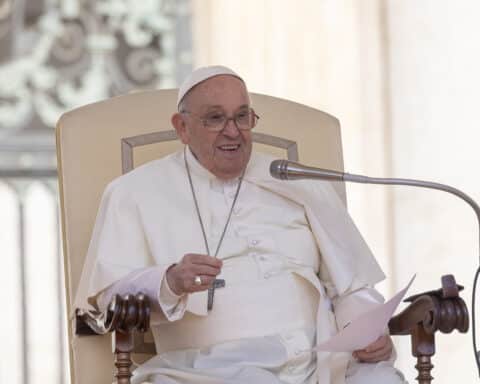
As we consider these readings for the Fourth Sunday in Ordinary Time, as we consider our Christian walk generally, it’s good to recall this simple truth, the virtue without which no Christian walk is possible — humility.
St. Benedict said humility and discipline form the steps of the ladder to heaven, which we should eagerly climb “if we desire to attain speedily that exaltation in heaven,” he wrote. This, too, is what Jesus plainly said. “Whoever exalts himself will be humbled; but whoever humbles himself will be exalted” (Mt 23:12). He was talking to all those who, taking too much pride in heritage or status or education, were blinded from seeing who Jesus really was — not just some lowly carpenter, but the Christ. Pride is blinding; humility is enlightening; that’s the point.
| January 29 – Fourth Sunday in Ordinary Time |
|---|
|
Zep 2:3; 3:12-13 |
This sacred wisdom needs no defense; it belongs to the Tradition. There is no un-humble Christianity. Arrogant pride is antithetical to discipleship. St. Jerome once wrote, “Learn of me a holy arrogance,” but I’ve never liked that. With all due respect to the good Doctor of the Church, I think he was mistaken. No, the way of the Christian is the way of the Lamb — the gentle way, humble. No exceptions are to be made here. It includes me, includes St. Jerome, includes you.
For you will not understand the Catholic faith at all otherwise. You will not understand at all these beautiful words of Christ from the Sermon on the Mount. The Beatitudes reveal to us the beauty of God. That is, before they show us how we should live as Christians, they show us how God deals with us. God so loved the world that he was persecuted, falsely accused of evil; but his love is such that he loved the world anyway, was merciful anyway. And the moral point is that we’re to imitate God by living out the Beatitudes as he does — to be merciful, meek and to mourn with those who mourn as Christ does.
But to do that genuinely, we’d have to be willing to give up a lot. We’d have to give up control, our love of status and adulation. We’d have to live like God’s in charge, not picking and choosing just those bits of the Gospel we like while politely disregarding others. Do you love the poor? Sure, that may be easy for you. But what about loving your enemy? Especially that so-and-so? What about turning the other cheek? Do you tame that command into submission like you know better? Are you humble before such sacred dangerous advice?
You see my point? The Sermon on the Mount, and in fact the entire Bible, present us with wisdom it takes real humility to grasp. Almost every other verse in the Bible challenges us, tempting us to correct it or to disregard it because we like to think we know better than the word of God. That is, we’re often tempted to be un-humble. We’re conditioned socially to look only to ourselves, take our own counsel, stand on our own authority. But the danger is that attitude can ruin faith; to be honest, it will ruin faith. Even if the vocabulary on the surface remains Christian, without the virtue of humility whatever you’re doing or saying is not Christianity at all. I don’t care if you’re a bishop or a banker; this is true. This is why Jesus talked about wolves in sheep’s clothing; for such wolves are really out there, and they’re full of pride (cf. Mt 7:15).
But you: rest in the beauty of humbly seeking God. Never mind the arrogant and the proud; they are God’s problem. He’s got an endgame for them, and he doesn’t need our help. Our task is rather to resist the temptation to give up on humility. “Seek the Lord, all you humble of the earth” (Zep 2:3). That remains the way of wisdom, the way of true Christian discipleship. So, rejoice as a fool of the world for the sake of knowing Christ. Boast only in the Lord. Boast only in doing those strange things the Lord commands — loving the poor and your enemy, welcoming the stranger. Only humility prepares us to live this wonderfully strange Christian life. Which may be why humility is so rare, genuine Christianity too. But it needn’t be rare, if only we’ll be humble again like Jesus, our lowly almighty Lord.
Father Joshua J. Whitfield is pastor of St. Rita Catholic Community in Dallas and author of “The Crisis of Bad Preaching” (Ave Maria Press, $17.95) and other books.





